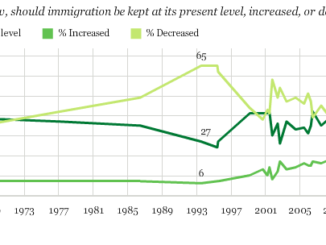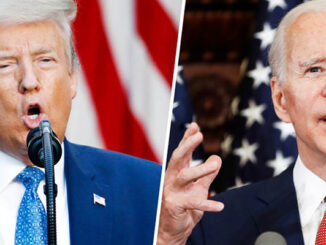
by Clint Bolick
As Jeb Bush explores a 2016 presidential bid, several conservative pundits are inciting the Republican base against him by reducing his immigration agenda to a one-word caricature: amnesty. “Jeb Bush wants it,” Rush Limbaugh said on Dec. 17. Iowa talk-show host Steve Deace said four days later; “He’s not just for amnesty; he’s an apostle for it.”
Such critics either don’t understand the meaning of the word amnesty, or they are unfamiliar with Mr. Bush’s positions. He has set forth a comprehensive proposal to reform the nation’s immigration policies—and if conservatives get past false depictions and consider his ideas on the merits, they will find much to applaud.
Mr. Bush is passionately pro-immigration, which may set him apart from some on the right. But he is also passionately pro-rule of law, a principle that guides his entire immigration strategy.
That principle led him to strongly criticize President Obama for his executive actions first legalizing the status of young people brought here illegally by their parents in October 2012, and then deferring enforcement action against the adults in November. Mr. Bush does believe that children who were brought here illegally and some adults should be eligible for legalized status once certain conditions are met. But he knows that the Constitution gives authority over naturalization to Congress, not the president—and that short-term, politically expedient executive actions do more to stifle enduring reform than to aid it.
Mr. Bush’s immigration agenda is set forth in “Immigration Wars: Forging an American Solution,” which he and I co-wrote in 2013. His agenda focuses less on the people who are here illegally than on who is allowed and not allowed to come legally, because that is the root of the problem with the immigration system.
Since the 1970s, America has become the only nation whose immigration system is based primarily not on work and skills but family preferences. The U.S. expanded the definition of “family” to encompass not just spouses and minor children but parents and siblings. Those relatives in turn become entitled to family preferences, leading to the phenomenon called “chain migration.” Nearly two-thirds of the one million legal immigrants each year come through family preferences—and hundreds of thousands arrive thanks to the expanded definition of the family in the law. Only about 13% of visas are available to those coming for work or bringing valuable skills.
Many family-preference immigrants are either very young or elderly, consuming social services rather than contributing to the tax base. Insufficient visas for high-tech workers force businesses to export jobs; agricultural production also shifts abroad—to Mexico, Central America, even China—when U.S. farmers can’t hire immigrant labor.
Ultimately the U.S. is losing the best and brightest—many of whom are educated in American universities—to countries such as Canada, New Zealand, Chile and China. And low-skill workers who cannot come legally often pursue illegal options.
Mr. Bush’s proposal would narrow the definition of family for preference purposes to spouses and minor children and increase work and skills-based visas. He would greatly strengthen border security, linking any legalized status for illegal immigrants to tangible progress on objective border security metrics.
A more robust guest-worker program, which unions have blocked, would ease pressure on illegal immigration. Employers would be matched with workers who would receive red cards containing computer chips to monitor entry and exit. The cards would be renewable annually so long as jobs are available. Many guest workers would return regularly to their families, paying U.S. taxes while consuming almost no services.
Those who prove they are law-abiding and hardworking can become eligible for green cards and eventual citizenship, though many will not choose that path. All of those reforms further Mr. Bush’s goal of making it easier to come legally than illegally and thus bolster the economy and the nation’s security.
Recognizing that the rule of law requires consequences for illegal actions, Mr. Bush proposes that illegal immigrants who came as adults should be subjected to penalties and not be eligible for citizenship. That proposal ignited a firestorm among liberals when the book was published, even as it helped forge a conservative alternative to the Senate’s “Gang of Eight” immigration bill in 2013. Yet now the proposal is derided in some circles as “amnesty,” when it is anything but.
Other Bush proposals that the pundits rarely mention have powerful appeal among conservatives:
• Requiring fingerprinting all foreign visitors, given that roughly half of all illegal immigrants came to the U.S. legally but overstayed their visas.
• Deploying military resources at the southern border to face down the threat from paramilitaristic Mexican drug cartels.
• Giving states a larger role in policing illegal immigration and flexibility in providing alternatives to federally mandated services such as emergency room treatment for illegal immigrants.
• Patching the loophole in federal law that led to a diaspora of Central American children seeking domicile in the U.S.
• Requiring tougher civics standards for passing the citizenship test—and extending those requirements to all students for high-school graduation.
Jeb Bush embraces immigration as the lifeblood of American history and prosperity, and he exhibits compassion even toward those who risk much to come illegally. But that compassion—a quality that other Republicans could do well to emulate—should not be mistaken for weakness. Mr. Bush believes there is only one proper way to enter the country—through legal means.
Reforming our nation’s defective immigration system requires courage, leadership and bipartisan compromise, all of which is a heavier lift than sniping from the sidelines. Mr. Bush’s detractors should engage his proposals rather than merely dismissing them with one-word epithets.
Mr. Bolick is vice president for litigation at the Goldwater Institute and a research fellow at Stanford University’s Hoover Institution. He is the co-author, with Jeb Bush, of “Immigration Wars: Forging an American Solution” (Threshold Editions, 2013).



